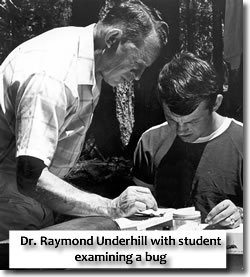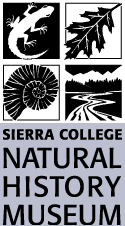Biological Sciences' Field Studies Program: A History
by Jim Wilson
Retired, Biological Sciences Dept., Sierra College
The Biology Field Studies Program has been serving the students and communities of Sierra College for almost as long as the college has existed. Field experiences, as part of a learning program, have been offered to our students to reinforce classroom learning and to provide them with practical experiences of working in the profession.

Dr. Underhill, Court, Bergthold, McElroy, Dailey and others have all made an extra effort to provide students with excellent experiences in the field. In the 1960's the Life Science Department, which was the previous name for the Biological Sciences Department, would routinely travel to deep in to Baja, Mexico each winter break to study marine life, extreme deserts and cultures very different from Rocklin. In those days, private vehicles were used and many volunteer their efforts to accomplish the trips successfully.
Spring break field trips
During the spring break, the department's main field activities centered on the coastal areas of California. Dr. Underhill would take a group to explore the Fort Bragg to Albion region for plant, bird and marine life. Roland Bergthold would lead botany trips, many times coordinating them with the California Native Plant Society's field trips, thereby giving our students a chance to interact, not only with the plants, but with the leading botanists of the state.
In the fall, numerous trips to Dillon Beach were arranged to study marine life in Tomales Bay. Sierra's students spent the day on a oceanographic research vessel, learning to sample, measure and record oceanographic parameters and identify marine life from the deck and underneath when they were able to go diving in the bay.
Expanding the field trip program

Later in the 1970's and 1980's, the biology field program expanded into the structure we have today. Charles Dailey, Jim Wilson and others continued the marine studies as well as increasing the use of desert areas. During the summers, Ernest Riley and Jim Moore led an almost month long field survey of the ecological communities of the State of California that involved four field trips within days of each other to visit the living diversity of habitats within the state.
Every corner of the state was visited including most of the places in between. It was an experience to visit Death Valley in the middle of July when air temperatures were reaching 115 degrees and the ground temperatures were even hotter. Jim and Harriet Wilson assisted them each summer along with the 30-40 students, all attending at one time. In the past, many interdisciplinary trips where conducted with the departments of photography, earth science, astronomy and geology during this time. Today, we have many of our faculty teaching selected field classes.
Streamlining and adding variety
The Bio. Sci. 16 (Series A-Z) Field Studies in Biology was established to streamline the increasing demand for field study offerings and to streamline the academic tracking of this important program. The new and flexible format for the classes allowed for increased variety and the possibility to focus activities on the various trips. Field classes are still an important, strong, ongoing, part of Sierra College's unique instructional offerings, providing an increasingly important service to our communities and students. This series of field study offerings take students to prime study locations which best illustrate the variety of biology concepts and ideas being studied as well as the opportunity to explore some of the world's special environments.
Actual course content may vary depending on specific instructor's interest and site availability. Students are provided with practical experiences by working in the field, which can either introduce them to new ideas and concepts or reinforce classroom learning by providing actual, environmental examples, first-hand. Many students enroll in these classes prior to taking many of our other, more formal classes. As academically rigorous classes, they challenge the students to learn, often requiring special time commitments, wilderness camping, strong group interactions, high levels of cooperation, extended hiking or other related field skills. Although additional challenges are present, the students receive additional educational benefits in exchange from this style of learning. Field study programs allow for individualized learning styles to be used effectively.
